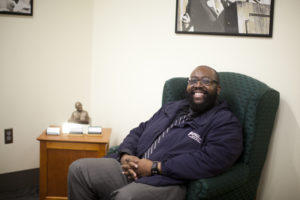Growing up in Spotsylvania County, Chris Williams lived mere minutes from James Farmer’s house. He’d spend summer days there soaking up the civil rights icon’s real-life tales of the part he played in the famous 1961 Freedom Rides and of his work at Mary Washington, where he taught history and American studies for more than a decade.
At 12, Williams landed a spot in UMW’s James Farmer Scholars Program, designed to encourage students who otherwise might not have considered going to college. Recently, Farmer’s former caretaker Brenda Sloan shared with Williams that Farmer thought a young Williams would “be someone important in the future.”
Now an accomplished writer whose work has been published in outlets like The Atlantic and The Huffington Post, Williams has come full circle. As a college administrator, he’s helped students from varying backgrounds through struggles ranging from learning disabilities to racism.
And as assistant director of UMW’s James Farmer Multicultural Center (JFMC) since September 2017, his work includes helping plan events like UMW’s weeklong Dr. Martin Luther King Jr. Celebration and “encapsulates the very things [Farmer] stood for during his lifetime,” Williams said.
“My experiences with him are something that I will treasure for the rest of my life,” he said. “More people need to know how great he was and the grand legacy he left behind for us.”
Q: What’s most rewarding about your job?
A: The daily impact I have on our students and the meaningful relationships I’ve built with them, along with colleagues, staff and faculty.
Q: What’s most challenging?
A: Finding a good work-life balance.
Q: What’s your proudest accomplishment so far at UMW?
A: When I accepted this position, I was asked to cultivate and implement a Social Justice and Leadership Summit here at the university. With help from colleagues, university leadership, faculty and students, I was able to create something original and unique that’s become a popular event on campus. I was given the latitude to utilize my talents, resources and skill sets to bring JFMC Director Marion Sanford’s vision for the summit to fruition. I’m proud of it because of the diversity and inclusivity it showcased and because of the dedication of staff, faculty and students to the mission of obtaining social justice for all persons. I also spearheaded the execution of the first Social Justice Fall Break Trip to Montgomery and Selma, Alabama.
Q: What do you hope UMW’s MLK celebration brings to the Fredericksburg community?
A: Over the years, I think there has been a tendency to dilute and soften the image and legacy of Dr. King by only celebrating quotes from his “I Have a Dream” speech. There was more at the core of the man. He was diligent and forthright in his work for obtaining civil rights, social justice and inclusion for all marginalized and disenfranchised people in this country. The JFMC provides programming that tells the true essence of Dr. King, especially what he stood for during the last years of his presence in the civil rights movement.
Q: You’ve had lots of articles published. Do you have a favorite?
A: I had the pleasure of interviewing legendary producer and engineer Malcolm Cecil regarding his involvement in securing a national holiday for Dr. King for Wax Poetics magazine in 2014. Many people don’t know that the initial introduction of the measure to pass a federal law was made by Rep. John Conyers Jr. and Sen. Edward Brooke in 1971. The bill languished in Congress until Jimmy Carter became president. The House of Representatives defeated it the same year, so Coretta Scott King worked feverishly to get it passed, traveling the country collecting endorsements for state and local political figures. After acquiring three million signatures … and being denied, it was clear that The King Memorial Center and Mrs. King needed another vehicle to accomplish their goal. That’s when Stevie Wonder and Gil Scott-Heron got involved, helping get legislation passed through the U.S. Congress and signed by then-president Ronald Reagan in 1983. On his album, Hotter Than July, Stevie Wonder wrote Happy Birthday in honor of Dr. King to bring more attention to the cause of getting him a national holiday. This story is a powerful example of how the arts can change our society for the better.
Q: You’ve written about musicians from Madonna to Marvin Gaye. Who’s your favorite?
A: Stevie Wonder. His music changed lives and altered the universe.
Q: What would people be surprised to learn about you?
A: I’m a man of many talents.
Q: Any mottos you live by?
A: Tell the truth.
